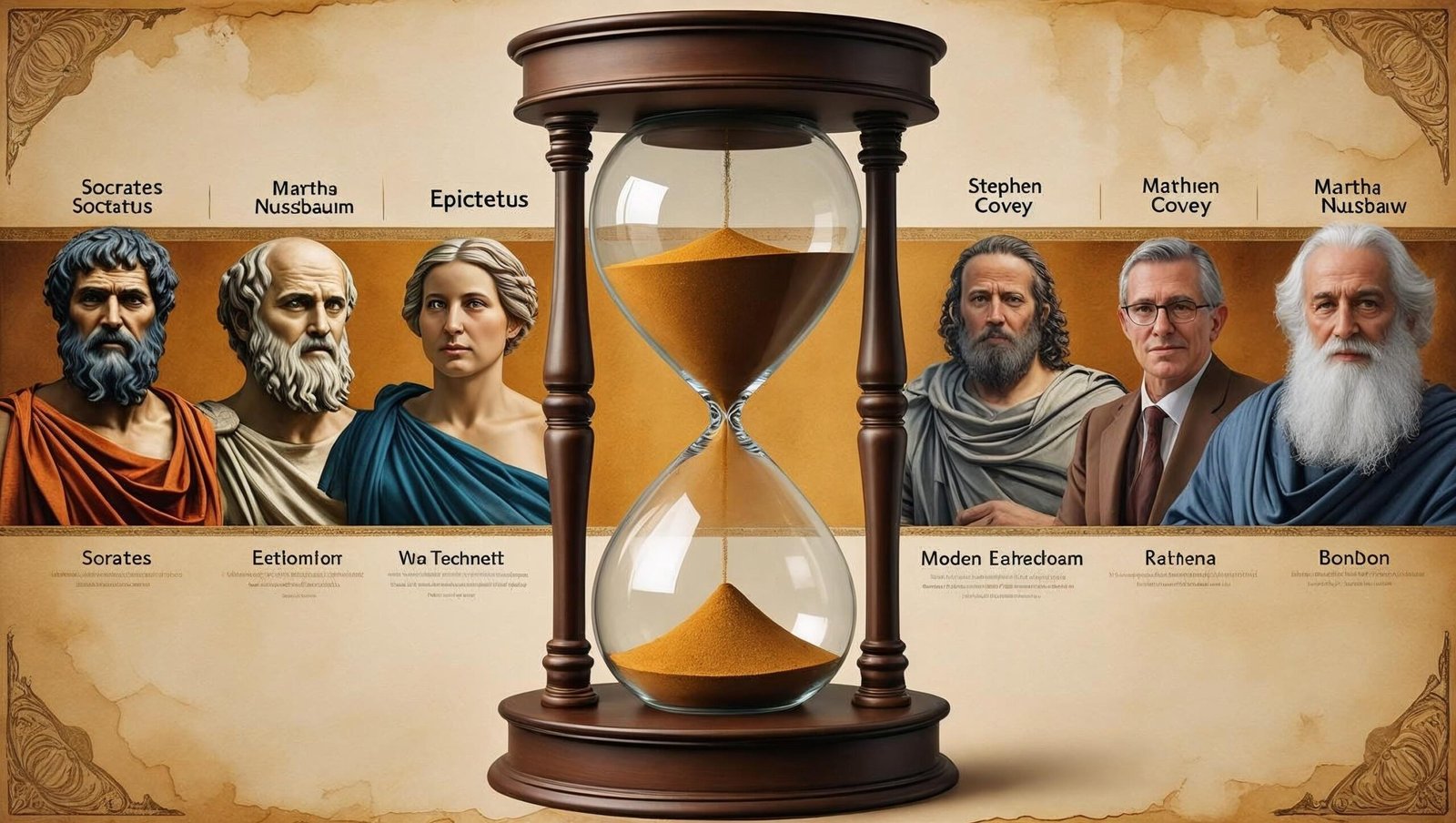On the Shortness of Life by Seneca: 13 Shocking Truths That Will Redefine Your Time
Time, the most elusive currency in our lives, continues to escape our grasp while we chase ambitions, distractions, and vanity. On the Shortness of Life by Seneca, a timeless philosophical treatise, confronts this harsh reality head-on. Penned in the first century by Lucius Annaeus Seneca, the Stoic philosopher, this brief yet seismic work still resonates powerfully with our hyper-distracted modern existence.
This blogpost seeks to delve into the enduring wisdom of On the Shortness of Life by Seneca, unpacking its central themes, examining its implications, and applying them to the 21st-century reader. Prepare to question your values, habits, and how you allocate the most precious asset you possess—time.

1. Life Is Not Short—We Just Waste It
Seneca’s most jarring proclamation in On the Shortness of Life by Seneca is that life is long enough if used wisely. The brevity we lament arises not from life’s limited span but from our profligate squandering of it. He states bluntly that people are frugal with money yet extravagant with time.
Modern parallels are evident. Social media, meaningless meetings, endless scrolling—these are our time-thieves. Seneca warns us: it’s not death that surprises us, but the realisation that we never truly lived.
2. The Delusion of Future Readiness
In On the Shortness of Life by Seneca, the author highlights the dangerous human tendency to defer living. People postpone joy, thinking they’ll have more time “later.” But “later” is a myth.
The Stoic reminds us that no one guarantees tomorrow. The wise, therefore, live now—not someday. This sobering truth speaks volumes to our modern productivity culture, obsessed with planning and future achievement while neglecting the present.
3. Busyness Is Not a Virtue
Seneca spares no mercy for those “busy” with trivialities. In On the Shortness of Life by Seneca, he argues that busyness masks emptiness. We fill calendars, rush between tasks, and boast of our packed schedules—falsely equating motion with meaning.
True purpose, according to Seneca, lies in deliberate, mindful living. Busyness, he argues, is the enemy of reflection. It prevents us from recognising that life is passing by unnoticed.
4. Borrowed Time Is Not Yours
One of the striking truths in On the Shortness of Life by Seneca is the observation that much of our life is lived for others. We surrender time to obligations, social expectations, and ambitions not truly our own.
Seneca warns: “People are frugal in guarding their personal property; but as soon as it comes to squandering time they are most wasteful of the one thing in which it is right to be stingy.” We lend our lives to employers, social norms, or shallow desires without pause to ask: Whose life am I really living?
5. Retirement Is a Mirage
For those delaying fulfilment until retirement, On the Shortness of Life by Seneca offers a stark critique. What if the body weakens before the soul awakens? What if retirement never comes?
Seneca teaches us not to defer meaningful pursuits. Wisdom, he insists, belongs to those who live fully now—not those who wait. Live intentionally today, rather than gambling on a fragile tomorrow.
6. Philosophy: The Art of Living Well
Philosophy, in On the Shortness of Life by Seneca, is not an abstract exercise but a vital practice. It’s a compass guiding us toward what truly matters. Through philosophy, we learn how to live, not merely exist.
Modern society often undervalues such inquiry, favouring utility over wisdom. But as Seneca insists, the philosophical life is the one most immune to time-wasting, fear, or regret.

7. The Tyranny of Distractions
On the Shortness of Life by Seneca addresses how distractions enslave us. Be it politics, gossip, or idle entertainment, we lose ourselves in matters of no enduring worth. Seneca’s Rome had its version of today’s digital noise—and he urged escape from it.
He writes, “You act like mortals in all that you fear, and like immortals in all that you desire.” The endless pursuit of the trivial gives the illusion of immortality while time slips by unnoticed.
8. Learning from the Past, Not Lamenting It
In On the Shortness of Life by Seneca, memory is a teacher, not a tormentor. The wise man reflects on the past to draw lessons, not regrets. Living well means embracing one’s past not with shame, but insight.
This calls for self-examination—an honest look at how we’ve used our years. Such reflection helps redirect the future.
9. Ownership of One’s Life
Seneca urges readers of On the Shortness of Life by Seneca to reclaim their agency. He argues that those who blindly follow routines, customs, or the herd lose control of their lives.
Reclaiming time begins with awareness. One must choose how to live, lest life be dictated by others’ agendas.
10. Death Is Not the Enemy
Death, Seneca argues, is not frightening in itself. It’s the fear of not having lived meaningfully that haunts us. On the Shortness of Life by Seneca invites us to cultivate peace with mortality by embracing each moment consciously.
When life is fully lived, death loses its sting.
11. The Tragedy of the Unexamined Life
“Many people spend their lives acquiring things, without ever questioning what they’re living for.” This could serve as the central warning of On the Shortness of Life by Seneca.
To drift through life without self-inquiry is, to Seneca, the gravest misuse of time.
12. True Leisure Is the Fruit of Wisdom
Seneca redefines leisure—not as idleness, but as deep contemplation and meaningful engagement. On the Shortness of Life by Seneca elevates the quiet life of reflection, reading, and learning as the highest luxury.
Today’s society pushes constant stimulation. Yet the wisdom of this Stoic teaches us that silence and solitude may be our greatest teachers.

13. Time: Your Most Precious Asset
Ultimately, On the Shortness of Life by Seneca is a call to value time above all. Not gold, not fame, not power—but time. Everything else can be regained; time, never.
The book closes not with despair but empowerment. Time may be slipping, but if we wake up, it is still ours to command.
Living with Intent: Beyond the Illusion of Progress
In an age where forward motion is mistaken for purpose, the question must be asked: are we moving toward something real, or simply hurtling past everything that matters? The tragedy of modernity lies in its worship of momentum. People chase promotions, accolades, followers, and credentials—all without pausing to examine whether the destination is worthy of the journey.
Seneca reminds us that time, not success, is our truest possession. He strips bare the illusion of perpetual progress and asks us to examine not how fast we move, but in what direction. The result is a powerful invitation not merely to live, but to live well.
Those who dare to scrutinise their calendar, reduce the noise, and align their days with enduring values will discover a richness of time hidden in plain sight. The modern soul, overwhelmed by distraction, must be reacquainted with what it means to spend time with intention.
The Cult of Productivity: A Modern Malady
Productivity, once a means, has become an end in itself. This pathological obsession with output seduces individuals into believing that the more one does, the more one matters. Yet, as On the Shortness of Life by Seneca implies, the busiest people often achieve the least of what truly matters.
A man may rise early, work tirelessly, and fill his life with obligations, yet still arrive at old age empty, having never truly lived. Activity, Seneca warns, is not synonymous with value. The philosopher invites us to confront a haunting reality: that a day spent reflecting in silence may be more fruitful than a week filled with frantic tasks.
The wise person measures success not in completed checklists but in the serenity of a life lived according to purpose.
Possessions vs. Presence
The delusion that more possessions equal more life has plagued human civilisation for centuries. Yet, nowhere is this fallacy more exposed than in the reflections of Seneca. In On the Shortness of Life by Seneca, he cautions against those who build wealth but lose themselves in the process.
A luxurious home may provide comfort, but cannot buy meaning. A collection of cars may impress neighbours, but cannot confer inner peace. True wealth, Seneca asserts, is having time and knowing what to do with it.
The frantic pursuit of material abundance robs people of presence. Each hour spent accumulating more is often an hour stolen from what matters most: connection, contemplation, and contribution.
The Timelessness of Stoic Wisdom
There’s a reason why On the Shortness of Life by Seneca continues to be read, centuries after it was penned. Its wisdom is not bound by empire or century, but by something universal—the human condition.
The Stoics understood something profound about time: that its value is not in its duration, but in its depth. Ten minutes of present, grateful living can hold more power than ten years of absent-minded drifting.
For the contemporary reader, the text is not merely a relic; it is a challenge. Will you embrace a life of self-governance, or continue to be led by default? Seneca’s answer is clear, and his urgency remains unchanged.
The Courage to Say No
One of the most liberating, yet underappreciated, disciplines of a meaningful life is the ability to say “no.” We are trained to be agreeable, to take on more, to accommodate—even at the expense of our sanity. But Seneca would consider this madness.
On the Shortness of Life by Seneca illustrates that the inability to set boundaries is not politeness—it is surrender. Each ‘yes’ to the trivial is a ‘no’ to what is vital. The person who learns to say “no” to what does not serve their higher aim reclaims time, clarity, and dignity.
This is not selfishness; it is wisdom. As Marcus Aurelius would later echo, “If you seek tranquility, do less—but do it better.”

Mastering the Art of Pausing
In a culture that applauds speed, pausing becomes a revolutionary act. The ability to stop, reflect, and reassess is not a sign of laziness, but of mastery.
Seneca knew this. He observed that those who pause to examine life are the ones who ultimately live it well. A moment of stillness can yield a torrent of clarity. Yet most people avoid silence, fearing what it may reveal.
But in the pause lies power. It is where direction replaces drift, where purpose overshadows performance, where being eclipses doing. In the teachings of On the Shortness of Life by Seneca, we find that silence is not the absence of life—but the soil in which life takes root.
Digital Time Thieves and Eternal Lessons
If Seneca were alive today, he would be astonished—and horrified—by the scale of voluntary distraction. Smartphones, social media, news cycles, and streaming services are the new tyrants of time.
The average individual today spends more time engaging with a screen than with their own soul. Seneca’s Rome had gladiator games; we have binge-worthy shows and endless reels. The difference is merely aesthetic—the result is the same: spiritual erosion through superficial engagement.
On the Shortness of Life by Seneca stands as a bulwark against this epidemic. It reminds us that a fulfilled life does not depend on how much entertainment we consume, but on how present we are to the life we already possess.
Friendship: A Time Worth Investing
Seneca viewed friendship as a profound expression of the examined life. It is not the quantity of relationships, but their quality that enriches existence. In a culture dominated by followers, likes, and online connections, the ancient wisdom feels refreshingly radical.
To cultivate one real friendship—built on honesty, shared values, and mutual growth—is to make a wise investment of time. The pursuit of popularity, by contrast, often scatters attention and exhausts the soul.
A page from On the Shortness of Life by Seneca urges us to ask: “Do I spend time with people who elevate me—or merely entertain me?” The answer often dictates the trajectory of a person’s emotional and spiritual life.
The Gift of Withdrawal
Solitude is not loneliness. It is the sacred space where the soul remembers itself. Seneca knew the power of retreat—not to escape the world, but to better understand it.
In today’s frantic world, withdrawal is countercultural. Yet it is often in retreat that one gathers the strength to re-enter life with purpose. This is not about isolation but about recalibration.
Reading On the Shortness of Life by Seneca in solitude, perhaps with a cup of tea and a silent room, may prove more transformative than any motivational seminar or productivity app.
A Final Meditation: Life, Lived or Spent?
Each sunrise presents a silent question: Will today be lived, or merely spent? The former requires courage, clarity, and conviction. The latter requires nothing—only inertia.
The central message of On the Shortness of Life by Seneca is not just a warning; it is a path. A path to a life that honours every moment. To embrace it is to step out of the current and stand on solid ground. It is to cease existing and begin living.

Conclusion: Seize the Time Left
On the Shortness of Life by Seneca remains more relevant than ever. In a world drowning in noise, urgency, and consumption, it offers a radical alternative: clarity, presence, and purpose.
Its challenge is simple yet daunting—will we continue to sleepwalk through life, or will we awaken and live deliberately?
Seneca’s voice echoes through millennia, urging us to choose presence over procrastination, wisdom over weariness, and meaning over mere motion. The brevity of life, rightly understood, becomes not a curse—but a call to live richly, deeply, now.
Let not another day slip by without asking yourself: Am I truly living?
FAQs
1. Who was Seneca?
Lucius Annaeus Seneca was a Roman Stoic philosopher, statesman, and dramatist. He lived during the first century AD and was an advisor to Emperor Nero. His writings, especially On the Shortness of Life by Seneca, are timeless meditations on ethics, mortality, and the art of living.
2. What is the main message of On the Shortness of Life by Seneca?
The central idea is that life is long enough if we use it wisely. It’s not the shortness of life that is the problem but how we waste it through distractions, meaningless pursuits, and procrastination.
3. Is this book relevant for modern readers?
Absolutely. On the Shortness of Life by Seneca speaks directly to our current age of overstimulation and busyness. Its message challenges the consumerist mindset and promotes conscious, intentional living.
4. How can I apply Seneca’s lessons today?
Start by tracking how you spend your time. Limit distractions, reflect daily, embrace solitude, and align your actions with your core values. Seneca’s wisdom becomes real when it’s lived, not just read.
5. Is On the Shortness of Life by Seneca difficult to understand?
While it was written centuries ago, most translations today render it clearly and powerfully. Its insights are direct and piercing, making it suitable for readers of all backgrounds.
📌 For more powerful insights like this, visit shubhanshuinsights.com. Leave a comment below—How are you spending your time?